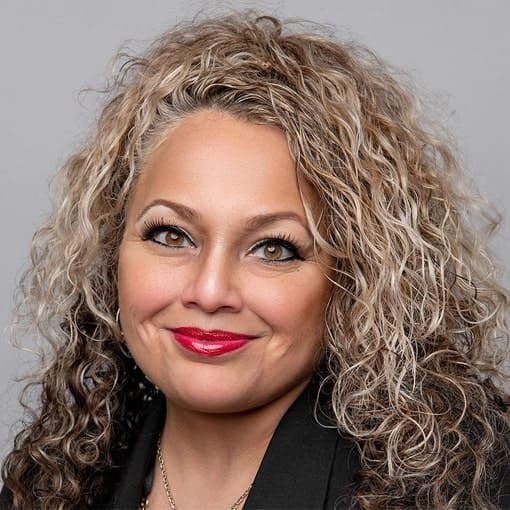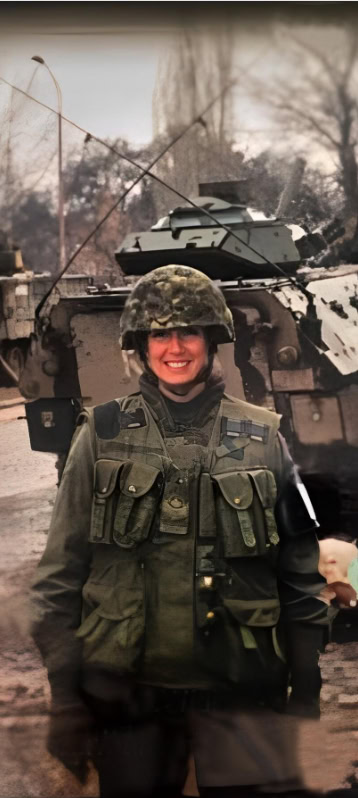
Hello, I’m Gloria Segovia, the founder of AERCS. I am proud to introduce you to our specialized approach to therapy for women veterans focusing on trauma therapy. In our sessions, women veterans are provided with a secure space to explore and express their emotions, confronting trauma through proven therapeutic methods. Whether you are grappling with PTSD, trauma, adjusting to life after service, or just in need of a supportive environment to heal, I want you to know: you’re not alone.
TL;DR Key Takeaways.
- Focus on Women Veterans: Tailored therapy for Canadian women veterans dealing with trauma.
- Therapeutic Approaches: Utilizes methods like Cognitive Processing Therapy and Dialectical Behaviour Therapy.
- Support Systems: Highlights the importance of support groups and trauma-informed care.
- Practical Guidance: Provides tips on managing mental health and accessing services.
- Empowerment and Recovery: Emphasizes empowerment through therapy and building resilience.
Listen to the audio clip discussing this post…

Empowering Women Veterans:
If you’ve served in the Canadian forces and are navigating life as a woman veteran, this one’s especially for you. I understand that the journey doesn’t end upon returning home transitioning back to civilian life comes with its own set of challenges that are quite unique to women like yourself.
Let’s dive right into a critical issue many don’t talk enough about: gender-specific trauma. It’s more common than many think, affecting a significant number of women veterans. If you’re dealing with the aftermath of military sexual trauma (MST) or other distressing experiences that happened during service, the effects, as you may well know, can linger, deeply impacting your daily life and mental health.
I’m here to guide you through understanding these challenges and showing you practical ways to manage your mental health effectively – And how AERCS can help. AERCS is here to help you explore ways to help overcome gender-specific traumas, so that you can reclaim your life with strength and resilience.
Empowering Women Veterans:
If you’ve served in the Canadian forces and are navigating life as a woman veteran, this one’s especially for you. I understand that the journey doesn’t end upon returning home transitioning back to civilian life comes with its own set of challenges that are quite unique to women like yourself.
Let’s dive right into a critical issue many don’t talk enough about: gender-specific trauma. It’s more common than many think, affecting a significant number of women veterans. If you’re dealing with the aftermath of military sexual trauma (MST) or other distressing experiences that happened during service, the effects, as you may well know, can linger, deeply impacting your daily life and mental health.
I’m here to guide you through understanding these challenges and showing you practical ways to manage your mental health effectively – And how AERCS can help. AERCS is here to help you explore ways to help overcome gender-specific traumas, so that you can reclaim your life with strength and resilience.
Did you know?
The 2021 Census found that nearly one in six (16.2%) Canadian veterans are women.
As of February 2023, out of the total 147,748 veterans served by Veterans Affairs Canada (VAC), 19,150 (12.9%) were female veterans.
Depression and anxiety: Women with PTSD are more likely to develop depression and anxiety disorders compared to men with PTSD.
Functional impairment: Women who screen positive for PTSD report poorer health-related quality of life and more difficulty with daily activities and social functioning.
Understanding Gender-Specific Trauma.
Many women veterans experience gender-specific trauma. This isn’t just about the challenges you faced during your service but about understanding and healing from them in a way that respects your unique experiences.
What is Military Sexual Trauma (MST)?
Military Sexual Trauma, or MST, includes any sexual harassment or assault that occurred during your military service. This can range from unwelcome sexual advances to the more severe forms of sexual assault. It’s not just about the act itself; it’s the betrayal in a setting where you were supposed to be safe and supported. And it’s not just MST; other traumatic experiences unique to women can also leave lasting scars.
The Repercussions are Real.
The emotional and psychological impact of such traumas can be profound. Women veterans who have experienced MST often find themselves grappling with heightened rates of mood disorders, anxiety, and PTSD. One study that highlights the stark reality: women veterans who endured MST showed significantly higher instances of lifetime and past-year mood or anxiety disorders and PTSD compared to those who did not experience MST (read more about this study).
A Pathway to Healing with AERCS.
Now, knowing all this, where do you turn? This is where the AERCS trauma-informed care comes into play. The approach isn’t just about treating symptoms; it’s also about understanding the root causes of your distress and addressing them in a safe, supportive environment.
Trauma-informed therapy is also designed specifically to help women veterans like you, navigate the aftermath of traumatic experiences. It offers a compassionate pathway to healing, you can check out the Trauma-Informed Therapy services, where you can get a better understanding about how this works.
Navigating through these challenges may feel daunting, but understanding the nature of the trauma and recognizing the available support are crucial first steps. With the right care and support, healing is not just a possibility but a pathway forward to reclaiming your peace and well-being.
Managing Dual Roles and Expectations.
Let’s chat about something many of you, as women veterans, might be finding tricky juggling the multiple roles and expectations that come with civilian life. Transitioning back isn’t just about swapping a uniform for civilian clothes; it’s about adapting to entirely new roles, often simultaneously. You might find yourself as a professional in a demanding job, a caregiver at home, and an active community member. It’s a lot, isn’t it?
The Balancing Act.
When you’re trying to balance professional responsibilities with personal commitments and community involvement, the pressure can pile up quickly. It’s not uncommon to feel stretched too thin, which can lead to stress and burnout. But here’s where understanding and managing expectations both your own and those of others becomes crucial.
AERCS – Support in Navigating These Waters.
At AERCS, the focus is on trauma-informed therapy that doesn’t just acknowledge the trauma but also the everyday stresses that come with these dual roles. This approach is particularly beneficial for managing the unique pressures you face. Our therapy sessions provide the tools and strategies to help you handle stress more effectively, and maintain your well-being in the midst of busy schedules. Curious about how it works? Check out our detailed approach on the AERCS Trauma-Informed Therapy page.
Coping with Hyperarousal Symptoms.
Part of what makes balancing these roles so challenging are the hyperarousal symptoms associated with PTSD feeling jumpy, having difficulty controlling emotions, or avoiding things that remind you of past trauma. These reactions are more common in women with PTSD and can complicate your day-to-day interactions and responsibilities (learn more about PTSD in women).

Practical Tips for Effective Coping.
- Recognize Your Triggers: Understanding what triggers your stress or anxiety is the first step in managing it.
- Set Clear Boundaries: It’s okay to say no. This is because setting limits helps prevent burnout, while keeps your roles manageable.
- Prioritize Self-Care: Regular self-care isn’t selfish; it’s essential. This might mean setting aside time for exercise, meditation, or just unwinding.
- Seek Professional Guidance: Engaging in therapy helps provide you with tailored strategies. Startegies that will help you cope with stress, to improve your overall mental health.
- Build a Support Network: Connect with other women veterans who understand what you’re going through. Sharing experiences and solutions can be incredibly empowering.
Balancing these roles isn’t easy, but with the right strategies and support, you can navigate these challenges more smoothly.
Combating Social Stigma and Isolation.
A significant challenge many women veterans face after service is social stigma and isolation. In this case I’m talking about overcoming the barriers that keep you from feeling fully integrated and understood.
Understanding the Impact of Stigma.
Stigma can manifest in many ways, and it’s often driven by misconceptions about military service and mental health. For women veterans, this can be compounded by stereotypes about gender roles. In turn this can lead to isolation, making it harder to seek help and connect with others who might share similar experiences.
Creating a Supportive Environment with AERCS.
AERCS offers a trauma-informed therapeutic environment that is tailor-made to help you heal without judgment. Doing it this way is important for addressing not only trauma, but also the loneliness that many women feel from being misunderstood by those around them. To see how AERCS structures its support, check out their Trauma-Informed Therapy page.
Practical Tips for Combating Isolation.
- Stay Connected: Make it a point to regularly check in with friends and family. Simple conversations can make a big difference.
- Volunteer: Giving back can help you connect with others and strengthen community ties.
- Educate Others: Sharing your experiences can help break down the stereotypes and stigma associated with being a woman veteran.
- Seek Professional Help for PTSD: If hyperarousal symptoms like feeling jumpy, having trouble controlling emotions, or avoiding reminders of trauma are isolating you, professional help can offer strategies to manage these feelings effectively.
Remember, reaching out is not a sign of weakness but a step towards rebuilding your community and support network. You’re not alone in this journey, and there are many paths available to help you reconnect and thrive post-service.
Enhancing Accessibility to Mental Health Services.
For accessibility of mental health services for women veterans like yourself, it’s vital that you have access to services that not only understand the nuances of your experiences but are also tailored to meet your specific needs.
A Variety of Therapeutic Approaches at AERCS.
AERCS offers a broad range of therapeutic approaches designed to cater to the diverse needs of veterans. These include:
- Cognitive Processing Therapy (CPT): Especially useful for those dealing with PTSD, this therapy helps you understand and modify the negative thoughts related to your trauma.
- Dialectical Behaviour Therapy (DBT): This method is great for emotional regulation, helping you manage impulsivity and improve your relationships through mindfulness, distress tolerance, and emotional regulation.
- Cognitive Behavioural Therapy (CBT): Focuses on changing negative thought patterns that impact your behavior and emotions, it’s effective for a variety of issues including depression and anxiety.
Each of these therapies is adapted to address the unique challenges faced by veterans, especially those encountered by women in service. For a deeper look into how these therapies work, check out AERCS’s Trauma-Informed Therapy page.
Importance of Accessible Mental Health Services.
Having accessible, veteran-specific mental health services is not just about availability; it’s about providing care that resonates with your specific experiences and respects the background you come from. AERCS tailors its services to ensure that they meet the nuanced needs of women veterans, focusing on areas most impactful to you.
Practical Tips for Accessing These Services.
Sometimes this can feel overwhelming, so here are some tips to help you access the support you need:
- Understand Your Coverage: Start by understanding what your insurance covers. For veterans, services might be covered under specific programs or through Veterans Affairs Canada. It’s worthwhile calling your provider to see what’s available to you.
- Reach Out for Help: Don’t hesitate to contact AERCS directly. We can provide guidance on how to access services and what steps you might need to take.
- Prepare for Your Visit: When you book your appointment, ask about the documents you might need to bring and whether there are any forms you should fill out beforehand.
- Ask About Remote Options: If travelling is a challenge, ask about online counselling options. Many services are now available remotely.
Final Thoughts for Women Veterans.
Your path to healing and empowerment is not only possible but fully within reach.
Recap of Our Journey.
I’ve delved into the unique aspects of trauma specific to women veterans who’ve served in the military, highlighting how experiences like military sexual trauma (MST) can deeply affect your mental health. I’ve also explored how balancing multiple roles as a woman veteran transitioning back to civilian life can add stress but how therapies and support systems like those at AERCS can help manage these challenges effectively. I also touched on the importance of combating social stigma and isolation, but at the same time, emphasizing the power of community and support networks.
Take action!
I strongly encourage you, as a woman veteran, to reach out and take full advantage of the resources available to you. Whether it’s at AERCS through therapy sessions, community groups, or online forums, remember that seeking help is a sign of strength and the first step towards reclaiming your life. For more detailed information on how to access some resources, you can visit the AERCS Trauma-Informed Therapy page.
A Message of Hope.
Let’s end on a note of empowerment. Your journey may have its challenges, but remember, resilience and recovery are not just possibilities – they are within your grasp. Every step you take towards healing is a step towards a brighter, more empowered future. As you continue to navigate your path, remember that your experiences are valid, your challenges are surmountable, and your potential for growth and happiness is immense.
Thank you for your courage and your trust in this journey. Keep pushing forward, stay connected, and never hesitate to reach out for support. You are not alone, and your journey of recovery and empowerment is just beginning. Let’s keep the conversation going and continue to support each other in this community of incredible women veterans.
5 Point Checklist for Choosing a Women’s Veteran Trauma Therapist:
- Look for veteran and women-specific expertise.
- Verify provincial licensing and credentials.
- Confirm they use trauma-focused therapies like CBT, EMDR, etc.
- Check for convenient location or online options.
- Ensure a comfortable and safe rapport.
Using this short checklist can help streamline your decision-making process, helping you find the best possible trauma support.
FAQ for Women Veterans.
What are common mental health challenges faced by women veterans?
Women veterans often face unique mental health challenges including PTSD, anxiety, and depression, often stemming from military sexual trauma (MST) and the difficulties of transitioning to civilian life.
How can women veterans overcome gender-specific trauma?
Overcoming gender-specific trauma involves seeking specialized trauma-informed therapy, participating in support groups, and utilizing therapies such as Cognitive Processing Therapy (CPT) and Dialectical Behavior Therapy (DBT).
What support systems are available for women veterans in Canada?
Women veterans can access support through various services such as AERCS, Veterans Affairs Canada, and other non-profit organizations that provide counseling and community support specifically tailored to women veterans.
How can women veterans access mental health services in Canada?
Women veterans can access mental health services by checking eligibility for Veterans Affairs support, looking into local veteran support organizations, and consulting with healthcare providers about mental health programs designed for veterans.
Why is it important to address mental health issues specifically for women veterans?
Why is it important to address mental health issues specifically for women veterans?
Addressing mental health specifically for women veterans is crucial due to their unique experiences and the significant impact of these on their overall well-being and integration into civilian life. Tailored support helps address specific needs and improves recovery outcomes.
Do You Need Trauma Therapy as a Woman Veteran?
Take this quick quiz to see if trauma therapy at AERCS could benefit you!










